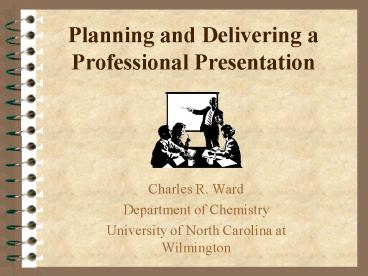Planning and Delivering a Professional Presentation - PowerPoint PPT Presentation
1 / 11
Title:
Planning and Delivering a Professional Presentation
Description:
Overhead Transparencies (foils) rapid preparation. some modification possible ... 9. Waste time searching for a specific overhead foil somewhere in your pile. ... – PowerPoint PPT presentation
Number of Views:38
Avg rating:3.0/5.0
Title: Planning and Delivering a Professional Presentation
1
Planning and Delivering a Professional
Presentation
- Charles R. Ward
- Department of Chemistry
- University of North Carolina at Wilmington
2
Several Types of Presentations
- Sales Presentation
- 10 to 15 minutes
- high impact, usually flashy
- Progress Report
- 15 minutes to 1 hour
- format varies
- Professional Meeting
- 15 to 45 minutes
- conservative combination of text graphics
3
Selecting the Format
- Overhead Transparencies (foils)
- rapid preparation
- some modification possible
- speaker notes can be written on boarders
- equipment almost always available
- equipment always reliable or easy to repair
rapidly - not suitable for large rooms
- lacks flexibility (no audio, video, animations)
4
Selecting the Format
- Computer-based Presentations
- rapid preparation
- easy to modify
- suitable for all size rooms
- equipment becoming increasingly more available
- equipment can be difficult to repair
- compatibility issues
- extremely flexible (audio, video, pictures,
animations)
5
Presentation Layout
- Title Page
- Title
- Name
- Organization
- Outline (research presentation)
- Introduction
- Methods
- Data
- Discussion
- Conclusion(s)
- Acknowledgements
6
Things to Consider
- Old Presentation Maxim
- Tell them what you are going to tell them.
- Tell them.
- Tell them what you told them.
- Convince the audience that your topic is
important and explain why you are interested in
it. - Tell a complete story with a beginning, middle,
and end.
7
15 Ways to Get Your Audience to Leave You
Peter Sigmund, University of Odense, Physics
Today, August, 1988, p. 86.
- 1. Cover too much material.
- 2. Include too many details.
- 3. Start with too much small talk.
- 4. Run over the allotted speaking time.
- 5. Avoid telling the audience why your research
has been done. - 6. Overestimate, or at least fail to assess, the
audiences level of knowledge.
8
15 Ways to Get Your Audience to Leave You
Peter Sigmund, University of Odense, Physics
Today, August, 1988, p. 86.
7. Fail to make eye contact with the audience. 8.
Ignore the inherent difference that exists
between oral and written communication. 9. Waste
time searching for a specific overhead foil
somewhere in your pile. 10. Use unexplained
terminology, abbreviations, and acronyms. 11. Use
unexplained symbols in text or equations.
9
15 Ways to Get Your Audience to Leave You
Peter Sigmund, University of Odense, Physics
Today, August, 1988, p. 86.
12. Use unexplained graphics. 13. Present visual
aids that are unreadable. 14. Read extensively
from projected transparencies. 15. If the
moderator has just introduced you to the
audience, alienate both parties by opening your
presentation with such details as your name, your
affiliation, and the title of your talk.
10
Selecting a Topic
- Chemical and Engineering News
- http//pubs.acs.org/cen
- ChemTech
- http//pubs.acs.org/journals/chtedd
- The ACS ChemCenter
- http//www.chemcenter.org
- Science News
- http//www.sciencenews.org
11
(No Transcript)










![NOTE: To appreciate this presentation [and insure that it is not a mess], you need Microsoft fonts: PowerPoint PPT Presentation](https://s3.amazonaws.com/images.powershow.com/4691906.th0.jpg?_=20200514087)


![NOTE: To appreciate this presentation [and ensure that it is not a mess], you need Microsoft fonts: PowerPoint PPT Presentation](https://s3.amazonaws.com/images.powershow.com/6427398.th0.jpg?_=20200728051)

















